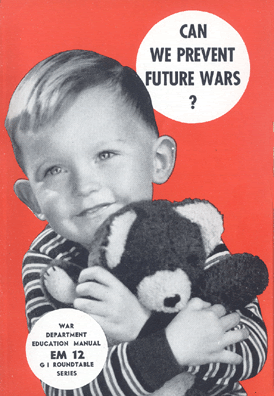By Arthur O. Lovejoy
Professor, Johns Hopkins University
(Published August 1944)
 Table of Contents
Table of Contents
What Means Could an International Organization Use to Prevent Wars?
Suggestions for Further Reading
Introduction
All over the world people are fighting and dying, suffering and sacrificing, praying and purposing that “It must not and shall not happen again.” Freedom from war has become the first essential of human well-being.
Much more is involved, of course, than the simple absence of war. But without peace there can be no solid ground on which to build just and lawful relations between nations or to protect peoples against enslavement. On freedom from war depend just and kindly relations among men, progress in knowledge and the arts, safety, prosperity, and the preservation of civilization.
Men have invented bigger and “better” weapons of destruction. The world has been shrinking in size. Countries have become more and more dependent on one another for the things they need. The distinction between combatants and noncombatants has been almost erased. These are some of the causes that have made modern war so ruinous and so monstrous. If after two world wars within a quarter century men are still unable to find the way to peace, human intelligence will have gone bankrupt.
Everybody has a stake in solving the problem of how to prevent war-but nobody understands the need better than those now serving in the armed forces. They know what modern war really is. They know what General Sherman meant when he said “War is hell.” They don’t want their sons to go through what they are going through—or the even worse experiences of a future war.
But we face no simple or easy problem. People have tried before to find a way of preventing war, but they have not succeeded. If the problem can be solved at all, one thing is certain: It will not be solved without a lot of hard thinking. And it isn’t enough to leave this hard thinking to a few statesmen and scholars. In a democracy these are not the people who settle the great issues. They can only be settled by the will of the majority. And they can be settled wisely only if the majority are willing to think about them coolly and carefully and to weigh the arguments for and against any proposed ways of settling them.
This pamphlet is intended for soldier discussion groups—for soldiers interested in doing some thinking and talking about the questions: Is there any way of preventing future wars? Why have previous attempts to prevent war failed? What proposals are now being made for preventing wars or for reducing their frequency, extent, duration, and destructiveness to the lowest possible minimum?
Some decisions have already been made by our own and other governments as to what shall be done toward safeguarding peace in the future.
Related Resources

September 7, 2024
Travel and Trade in Later Medieval Africa

September 6, 2024
Sacred Cloth: Silk in Medieval Western Europe

September 5, 2024